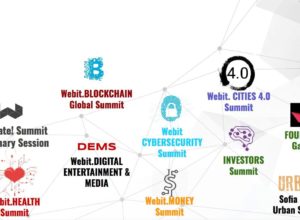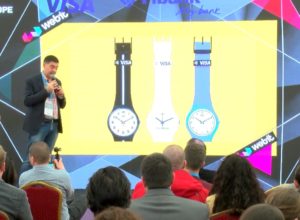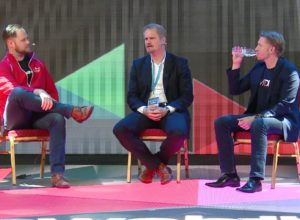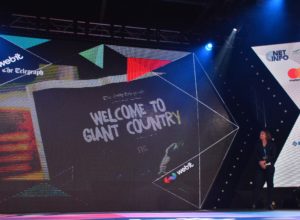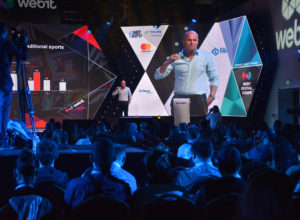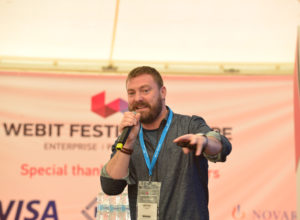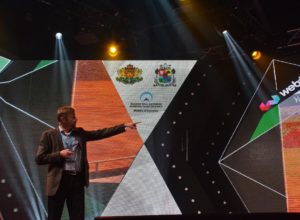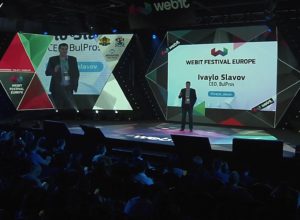Tag: webit.festival
It is all about experience and successful business networking!
With only one month till the 10th edition of Webit.Festival Europe 2018 (25-27 June '18) we are excited to share that we have added a new special lounge for your successful business networking at the Festival!
As you know, we had to move to a new venue because Webit.Festival 2018 doubled in size.
With all the space we need now - we decided that it is time go wild!
All the 6000 attendees from global enterprises, through SMEs to scaleups/startups, academia leaders and policy makers come to Webit for 4 main reasons:- to see the future (check the speakers and Europe's top 200 startups) - to establish their place in the future (policy makers and business leaders discuss digital policy initiatives) - to connect with the right people (see who attends) - and to make successful business with them and expand their networks So we take business networking at Webit very seriously!Thus today we present to you the new Webit Fountain Networking Lounge!
Yesterday we have commissioned a company to build a brand new Dancing Webit Fountain and a water mirror around which you shall have one more unique lounge for your successful networking. The magic is that after Webit this fountain shall be no more! A fountain built for only 3 days and only for your eyes! >GET YOUR WEBIT TICKET TODAY (prices go up this week)< The New Fountain Lounge adds to the number of other special lounges you may join and have your 1:1 or group business meetings while at Webit, including: - the AI Lounge - the Cybertech Lounge - the Cities 4.0 Lounge - the Blockchain Lounge - Innovate! Lounge - the Ladies Lounge - the Platinum Lounge Looking forward to welcome you @ Europe's tech, innovation and digital policy event for 2018!The transforming world of payments
Visa is not the first credit card!
Maybe it’s no news for you, but for the majority of the audience of the Red Stage at Webit Festival, it certainly was. The one who made that revelation is the General Manager of Visa for Israel, Mr. Oded Salomy. He had a keynote at last year’s edition on enabling the transforming world of payments. Visa is one of the names that probably need no introduction. “Visa” has become a nickname for our payment cards. So much, that people tend to there’s much more behind it than just a plastic for payments. Payments is such a vast area that it’s quite unpredictable what the future will bring. We never know what’s going to impact payments and the booming fintech industry. Everyday payments, business to business payments, business to customer payments and reverse.. Machines paying other machines rather than humans, biometrics being used in order to identify people by their biological characteristics.. All the way up to crypto currencies and tokens. New services, easier to work with and keeping a proper security level are needed by this ever evolving system. Numerous startups have been trying to be the next “big thing” that will shake the world of payments as the price of Bitcoin did some time ago.In the Internet of Things space things have been connecting to Fintech too
Wearables such as rings, bracelets, wrist-watches and keychains are becoming more than just accessories - there are already ones out in sale that can allow us to pay on the move. Another category that’s being impacted is the connected cars. With just an Internet connection we can pay for grocery, for gas, parking, insurance while going to work or some more without the need to get out of the vehicle. And last but not least, check the Webit.Festival website for upcoming speakers and our ticket options.Dancing with an Elephant: Corporates & Startups
Apply for our Founders Games and get the chance of being among the 200 startups presenting their innovative idea in front of investors, business leaders and all attendees of Webit.Festival 2018.
Corporates & startups. Two forces of the business world which are as much different as they need each other. Brian Collins (AngelHack), Jonas Jacobi (IBM) & Matthias Schanze (Siemens) put some light on this complex relationship Mr. Schanze described as”Dancing with an elephant”
The open API (Application Programming Interfaces) revolution took of 5 years ago
A familiar example of APIs in action is the ability to sign into different accounts or services with our Facebook login. We can log into Pinterest, for example, by using our Facebook login credentials. That revolution was built on the idea that corporates could start opening up their technology for developers & startups. By doing so they were able to find a whole new strategy. In that way, the strategy shifted. It shifted from a B2B or a B2C focus to a Business to Developer focus. As such, innovation programming quickly went on the rise. Corporates began looking at developers and startups as a whole new strategy to their strategic plans and in doing so they’ve started working and finding ways to engage with startups & developers at an earlier and earlier stage.Why the relationship between startups & corporates is important
Big companies have more than enough funds to put in place and do their own research. What these companies have noted is that a lot of innovation occurs outside the company itself. That’s one of the main reasons companies like IBM, Siemens and others of this size have been involved in the startup ecosystem for quite some time already. Startups do set trends and it’s important for large corporations to always keep an eye on new trends and new technologies that are emerging fast. So what are these companies looking for? Big ideas. Great technologies. And innovations. Innovations that disrupt industries and possibly create new markets. Transformation, not only for the company itself but for its clients as well.Value proposition to the corporates
Corporates are well aware that they cannot invent everything by themselves. Co-creation and co-innovation with startups is a key point of their development. The transition is turning from internal Research & Development departments inside of corporates towards creating an external community, a liquid R&D force in essence. There’s the notion that most big corporates engage with, acquire or invest their funds in startups that already make some millions of revenue but in reality that is not the case anymore. The practice of an early engagement has grown immensely and that calls for more fair chances for more startups.Megatrends in Healthcare
Webit.Festival Europe 2017 shaped the milestones for all things digital in healthcare
The topic will be continued in 2018 with a separate 2-day event called Webit.Health co-chaired by Plamen Russev, the Chairman of Webit Foundation and Prof. Shafi Ahmed, Co-founder and surgeon of Medical Realities. Make sure to book your tickets now, at the Super earlybird price here. 2017 health Summit saw some of the biggest companies’ representatives in the world sitting together in a panel discussion - Rumyana Trencheva, Managing director SAP SountEast Europe, Mr Omer Saka, Partner at Deloitte, Dr Stamen Popov, General Manager Oncology of Novartis and Milena Stoycheva, CEO of JA Bulgaria, moderated by Dr. Rosen Dimitrov, Public Affairs Manager at Novartis. You have a vast experience in healthcare and innovations and wish to tell us about it - apply for speaking here. Ms Trencheva gave a good start of the discussion assuring that megatrends all over the world are not something selected, they are not happening in selected, VIP, countries - they are spreading. The contemporary consumer is demands more and more from the pharmaceuticals, from the technology companies and it is becoming ever more challenging to make sure consumers’ needs are met.The change of our perception on what healthcare is
Another megatrend that was clearly stated by Mr Saka is the change of our perception on what healthcare is do we mean a pill, a medical device of some kind or a hospital bed. The key solution is finding a way for these three elements to work together in the modern healthcare system. Furthermore, the matter of how much we, as consumers, pay for healthcare came to forefront. It is expected that in the next 10 years or less patients will be treated and will be provided with solutions that go beyond the pill - and this is for the mass, not only for the selected ones who can afford it. Dr Popov clearly stated that pharmaceutical companies no longer rely on the pill as a method of treatment - they broaden their vision using the digital technologies and these solutions will very soon come to patients who need them. This gives a huge advantage - transparency. Each of us, as human beings, is a data center, based on the choices we make every single day. In fact, transparency in healthcare system is a major block each of the technology companies all over the world are trying to achieve.With this follows one of the most important Megatrends - prevention as the form of treatment
It is considered that people nowadays take more and more care of themselves - in the form of wellness. We will have a huge number of population taking great measurements to maintain their health; in order to survive, people will take ownership on one’s health, environment and the ecosystem as well as putting efforts into changing the ecosystem. Finally, all these megatrends are impossible to happen without collaboration of technology companies, startups to bring fresh ideas and doctors. There’s no need for an engineer to develop an app by himself when they clearly don’t know specifics, rather, it is the healthcare industry to develop and change the ecosystem. Going out of the pharmaceutical industry, the biggest companies are also working on building connections with physicians and to use these relations to integrate new type of companies into this world. Webit.Health will continue this kinds of discussions in 26th - 27th June with ever more interesting guests who will show in action and demonstrate the modern healthcare - something that is happening now, not some time in the future. If you have an interesting idea and your company is less than 5 years old - show it by applying here.Exclusive content is what drives the audience in the Digital age
In the digital world we live in we get information about what is happening around the globe literally on every second. In an information environment like that the task of running a newspaper may seem almost impossible, especially if you want to reach the young audiences and Мillennials in general.
But there are more than several examples around the world of successful symbiosis between the old school analytical journalism and the fast lane news reporting using the tools that digital technology gives us.
During this year’s Webit.Festival Europe our guest had the chance to listen to the Global Entertainment Director of Telegraph Media Group talking about the customer journey through creative content and the right balance between engagement and scale in the media industry nowadays.
Parkinson has over 20 years experience in all aspects of Marketing and Distribution in the UK and International film distribution industry. Starting her career in the marketing department of the legendary Palace Pictures and then going on to roles as Promotions Manager at United International Pictures followed by 11 years as Head of Film across the Emap portfolio. Denise's most recent roles have included Director of International Marketing for Europe, Middle East and Africa for Disney, ABC and ESPN Television and Global Entertainment Director for Yahoo!
Recently she was asked by The Telegraph to develop the film category of their news. Now she works closer with the movie studios, while her work is increasing the revenue and contend on all communication channels of the 200-years old newspaper.
Expanding a media institution like The Telegraph to reach the digital audience is definitely not an easy task. The newspaper is a classic broadsheet with conservative analysis and old school media approach. But now its movie section is reaching the mass public, making the studios happy and getting a big part of their revenue through promotion campaigns.
That level of success required a complete reform in the way the media is producing content that work seamlessly with its digital and print products. And while the newspaper may look like a conservative broadsheet, the app is bright,visual and simple to use and give us the option to choose only the content we want to see and get notifications about the breaking news in the respective categories.
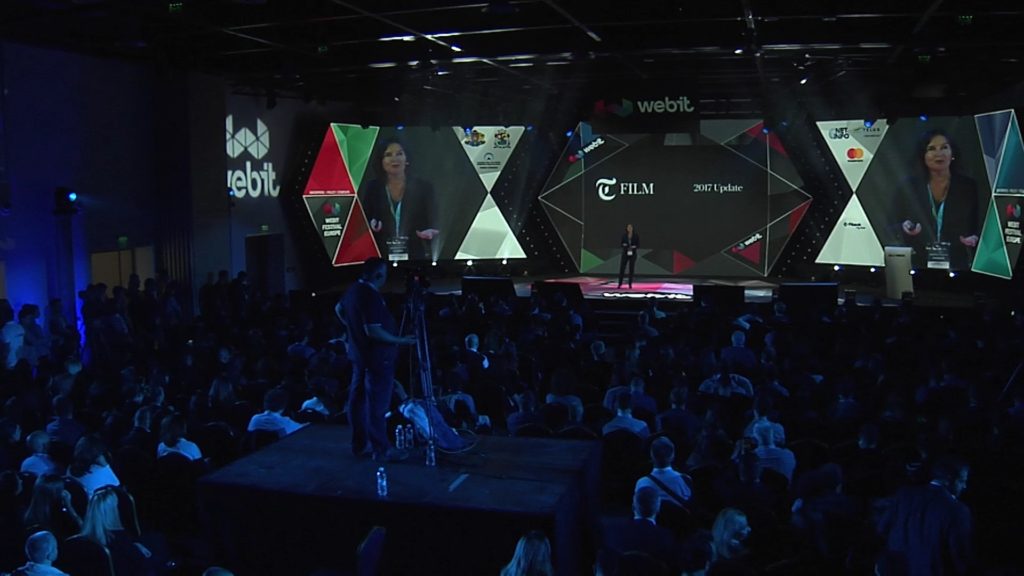 The Global Entertainment Director at Telegraph Media Group Denise Parkinson[/caption]
For the last several years The Telegraph established itself as the go to media when searching information about upcoming movies with its exclusive content and innovative Omni-channel approach.
The Global Entertainment Director at Telegraph Media Group Denise Parkinson[/caption]
For the last several years The Telegraph established itself as the go to media when searching information about upcoming movies with its exclusive content and innovative Omni-channel approach.
“This segment is about the consumer journey. It’s so hard to get cut through now and get stand through. It’s so hard to get people to go to the movie, when there is Netflix and Amazon and so many enticements to just stay at home and watch on your tablet”, Parkinson said.Today, The Telegraph is not just a quality newspaper for the British public, but a 360 degrees publisher with global reach through online website, mobile app and print edition. It has 22.5 monthly users. 6.7 million of them are reading news on a desktop computer, 4.4 million in print and 16.6 on various devices, so the mobile is really the growth area for the future. And while the media is publishing some premium content as part of its monetization strategy, 80% of the content is free and easy to access for the user. If you want in-depth analysis from any of The Telegraph’s columnists on sport, politics, entertainment, lifestyle etc., you need to pay a small monthly fee to access the premium sections of the newspaper online editions. With that, you also get subscribers benefits and unique opportunities, including even red carpet experiences. [caption id="attachment_5028" align="aligncenter" width="640"]
 The Global Entertainment Director at Telegraph Media Group Denise Parkinson[/caption]
For the last several years The Telegraph established itself as the go to media when searching information about upcoming movies with its exclusive content and innovative Omni-channel approach.
The Global Entertainment Director at Telegraph Media Group Denise Parkinson[/caption]
For the last several years The Telegraph established itself as the go to media when searching information about upcoming movies with its exclusive content and innovative Omni-channel approach.
“We are number 1 for cinema goers. That means that we have more cinema goers engaging with our brands than our competition. This is really important message to send to the film studios and to work with them on their promotions. We have a young audience. So for an old newspaper that has got a conservative tone and voice it’s really fantastic to know that we index much higher with youth audience more than you would expect. We actually have more users than Buzzfeed”, Parkinson said.As an example of the 360 degrees approach of the media she pointed out the exclusive interview with the Hollywood star Adam Driver. The Telegraph ran an online competition and gave its audience a chance to come to the interview, watch the film “Paterson” before its official premiere and meet the actor in person. Right now Adam Driver is really huge star because of his role as Kylo Ren in the reboot of the Star Wars saga and this kind of award is very interesting for the readers. The interview was streamed live for the people, who couldn’t win the tickets. According to Parkinson this is a complete integrated promotion that fits the distributor’s every need. Because they get a lot of pre-promotion, when the media was promoting the competition, that happened about 2 weeks before the film was released. And just a few days before the premiere the live interview happened. That interview was then edited and uploaded on the site to sustain the interest couple of weeks after the movie was released.
“It’s a win win and we get exclusive content which means if you are Adam Driver fan we are the only place that you can come to. So the most important thing is getting exclusives, because exclusives are what drives audience”, she explained.Going back to the old school approach, the newspaper was able to integrate the legacy of the brand and produce some engaging advertorials, because in the media business everything is about the engagement and keeping the audience on the page as long as possible. You may watch the full lecture of Denise Parkinson here: If you want to keep up with the latest trend in the world of digital economy and technology, then Webit.Festival is the right place for you. Visit our website and book 2 of our Super Earlybird tickets for Webit.Festival Europe 2018 for just €100. Feel the Webit vibe with some of the best photos from this year’s event! [easingslider id="4954"]
Esports and Gaming are defining entertainment for millennials
We all know at least one nerdy guy, who never leaves his parents place and is always playing video games with his friends online. Well guess what? He now has the chance to build his own Cinderella story and become a real rockstar without the need to give up on his hobby. In fact, he can even make a professional career out of it and compete for millions dollar prize at tournaments all over the world.
This is not a story taken from a Hollywood movie that is trying to make the nerds worldwide feel better about themselves. It is the reality of Esports - a trend that is driving the entertainment trends for hundreds of millions millennials around the globe.
At this year’s Webit.Festival Europe our guests had the chance to hear the CEO of MTGx Digital Ventures Arnd Benninghoff explaining the world of competitive Gaming and the amazing opportunities it creates for the entertainment market.
During his presentation he shared his views about the future of this new industry and compared it to the performance of other traditional sports during the last several years.
As an example of the impact of Esports today he showed the audience a YouTube video of the gamer “jackspeticeye” playing Rocketball - a game that is soon going to become a part of the official tournaments. He is playing games, commenting on this and gathering millions of views. The player now has over 15 million subscribers, while the video itself is viewed more than 4.2 million times.
And this is not at all a single case. In fact digital influencers all around the world gather millions of followers with new video format. Now they don’t need production companies, because they are able to produce videos from their living rooms.
Recent polls show that millennial stars come from the digital universe. In fact if you look at the top 10 influencers for the Generation Y you will find only two people from showbusiness. All the others are online stars, like the biggest youtuber PewDiePie, who now has over 55 million subscribers.
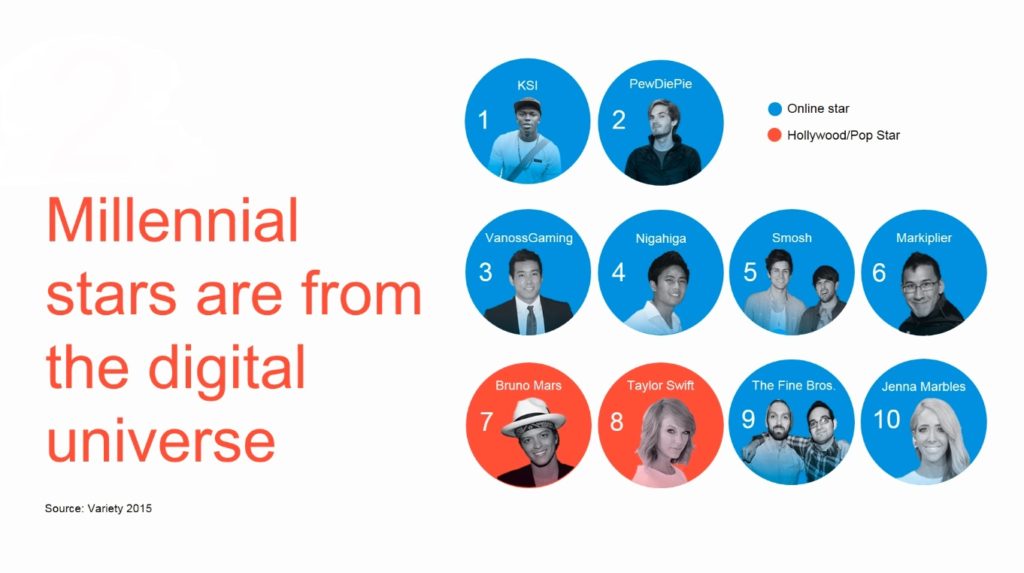
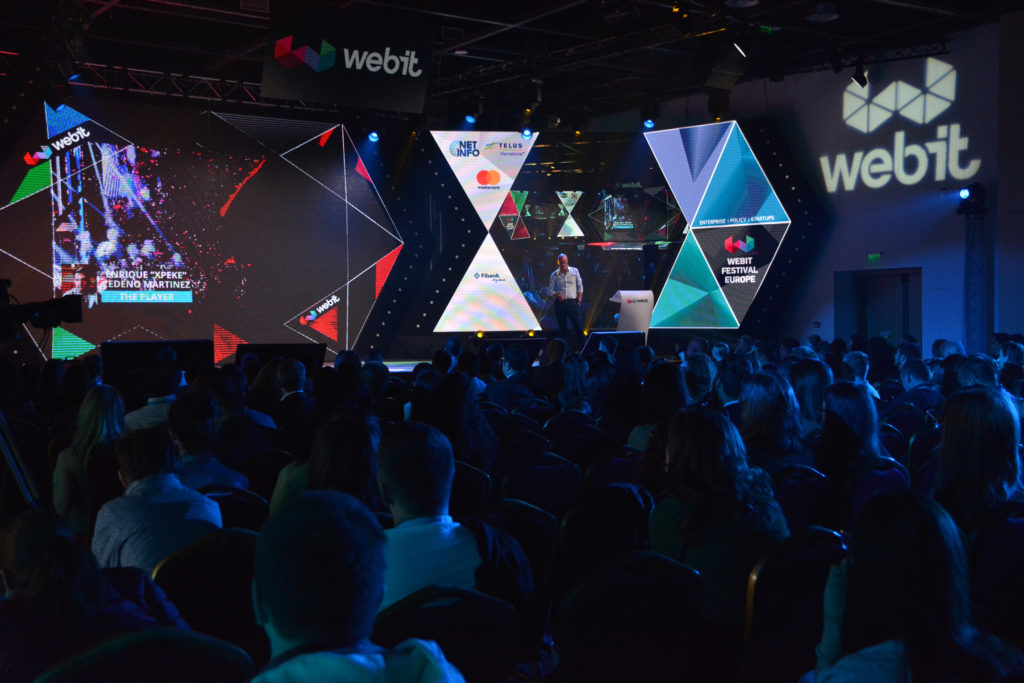 The CEO of MTGx Digital Ventures Arnd Benninghoff.[/caption]
There are now more than 2.2 billion gamers, while if you look at traditional sport there are about 2 billion sport fans. We have more than 20 relevant Esports games and over 200 professional Esports teams. These players do nothing but playing games. They live with their teammates in gaming houses, travel the world and competing for millions of prize money. And there are more than 324 million fans watching them on online platforms and already on TV.
Esports opens doors to millennials that are usually hard to reach via traditional media. They have credit cards next to them and you can easily convert them into buyers. That is the reason why the big brands now enter Esports. Corporations like Coca-Cola, Red Bull, Intel, Mastercard and Geico are investing in their own teams. Even traditional football clubs like Wolfsburg, PSG and Schalke 04 are planning Esports teams.
The CEO of MTGx Digital Ventures Arnd Benninghoff.[/caption]
There are now more than 2.2 billion gamers, while if you look at traditional sport there are about 2 billion sport fans. We have more than 20 relevant Esports games and over 200 professional Esports teams. These players do nothing but playing games. They live with their teammates in gaming houses, travel the world and competing for millions of prize money. And there are more than 324 million fans watching them on online platforms and already on TV.
Esports opens doors to millennials that are usually hard to reach via traditional media. They have credit cards next to them and you can easily convert them into buyers. That is the reason why the big brands now enter Esports. Corporations like Coca-Cola, Red Bull, Intel, Mastercard and Geico are investing in their own teams. Even traditional football clubs like Wolfsburg, PSG and Schalke 04 are planning Esports teams.

“More than 40% of the millennials in the US between 18 and 24 years of age are leaving the traditional TV and they are not coming back. What defines their life and their pop culture is games. Games are relevant storytelling. They spend an average of 107 minutes per day playing video games compared to 139 minutes watching live TV”, Benninghoff said.The new sport for this generation is called Esports. This is competitive Gaming that is able to fill big stadiums and now gives gamers the opportunity to play for millions prize money. The statistics of the streaming platforms can easily show us that it is getting even bigger than the traditional sports. Online Gaming means that you start your journey by downloading a game. You start playing the game, then you become a hero and spend hours playing the game. And guess what you do? You want to share your videos on Twitch. You are going to broadcast yourself. Then if you are really good, you will start playing in a team and become a pro gamer, which will be a new career for millions of youngsters. For the broadcasters Gaming is so interesting because it is often free to play. This means that you can just download the game you like and begin a story that can took hundreds of hours of playing time to complete. And now more than 30% of the daily mobile usage is Gaming. The average millennial is spending at least 1 hour per day into this. Benninghoff predicted that soon Esports are going to be added in the Olympic sports calendar. It only depends on the age of the International Olympic Committee members and when will they accept that this is already bigger than most of the other sports. According to ESPN analysts for the first time in generations we are witnessing the birth of a new sport. Gaming is what every traditional sports league is desperate to become - young, global, digital and increasingly diverse. [caption id="attachment_5014" align="aligncenter" width="640"]
 The CEO of MTGx Digital Ventures Arnd Benninghoff.[/caption]
There are now more than 2.2 billion gamers, while if you look at traditional sport there are about 2 billion sport fans. We have more than 20 relevant Esports games and over 200 professional Esports teams. These players do nothing but playing games. They live with their teammates in gaming houses, travel the world and competing for millions of prize money. And there are more than 324 million fans watching them on online platforms and already on TV.
Esports opens doors to millennials that are usually hard to reach via traditional media. They have credit cards next to them and you can easily convert them into buyers. That is the reason why the big brands now enter Esports. Corporations like Coca-Cola, Red Bull, Intel, Mastercard and Geico are investing in their own teams. Even traditional football clubs like Wolfsburg, PSG and Schalke 04 are planning Esports teams.
The CEO of MTGx Digital Ventures Arnd Benninghoff.[/caption]
There are now more than 2.2 billion gamers, while if you look at traditional sport there are about 2 billion sport fans. We have more than 20 relevant Esports games and over 200 professional Esports teams. These players do nothing but playing games. They live with their teammates in gaming houses, travel the world and competing for millions of prize money. And there are more than 324 million fans watching them on online platforms and already on TV.
Esports opens doors to millennials that are usually hard to reach via traditional media. They have credit cards next to them and you can easily convert them into buyers. That is the reason why the big brands now enter Esports. Corporations like Coca-Cola, Red Bull, Intel, Mastercard and Geico are investing in their own teams. Even traditional football clubs like Wolfsburg, PSG and Schalke 04 are planning Esports teams.
“Over the last few years the distribution platforms are driving the growth and even Facebook is entering live streaming for Esports. The TV stations are also experimenting with Esports content to bring back the millennials. And the next level will be VR where you can join the game, stand in the middle of the things happening and follow the action”, the expert said.Compared to the $100 billion games market Esports is still a niche market. But by 2020 it is expected to grow by 40% compared to the data for 2015. Asia is now waking up and China is going to be one of the biggest markets over the next year. This year the biggest Esports event happened in the Polish city Katowice and gathered more than 160 000 attendees and over 50 million viewers online. And if you still are not a believer of the Esports Cinderella story, just watch the trailer of the tournament and feel its atmosphere. You may watch Arnd Benninghoff’s full lecture here: If you want to keep up with the latest trend in the world of digital economy and technology, then Webit.Festival is the right place for you. Visit our website and book 2 of our Super Earlybird tickets for Webit.Festival Europe 2018 for just €100. Feel the Webit vibe with some of the best photos from this year’s event! [easingslider id="4954"]
How the Internet took away our ability to understand the world...
Over the past few decades the art of marketing has developed in an increasingly globalized world - a trend, that was only accelerated by the emergence of internet and digital technology. During that period of time we had almost a global liberal consensus, both politically and socially, about the path our world must take. But right now it looks like this world order is on its way to an inevitable collapse and this is something that leads to a massive change the way the companies are approaching consumers.
A lot of the brands that we know today took over in the last 25 years and were built on the basis of a global and unified world. In the reality now this is no longer true, because we realized that this concept can’t hold. There are people and constituencies around the world who had been left behind by globalization, who haven’t received benefits as much as other groups. And as a result of that we have the rise of populism. It has given us Trump in the USA, it has given us Brexit in the UK and perhaps even more horribly the phenomenon of grabbing power in Turkey.
During the recent Webit.Festival Europe we had the chance to hear these trends explained by the Chief Creative Officer of DigitasLBi Chris Clarke. During his presentation he talked about the death of empathy in the information age and shared his vision on the changes that needs to be made in order to protect our society from the dark and unintended consequences of the idea of free information.
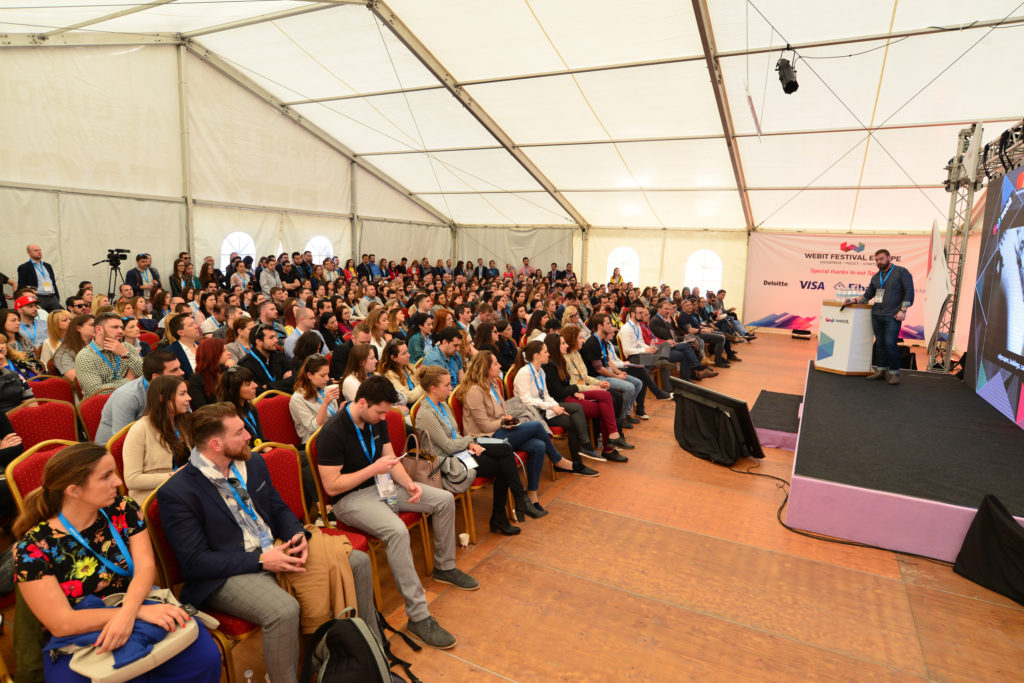 The Chief Creative Officer of DigitasLBi Chris Clarke[/caption]
Back in 2012 when Instagram was bought by Facebook for a $1 billion was the year when Kodak went bust. In its peak Kodak employed 300 000 people around the world and it made revenues of $3-4 billion a year. When Instagram was bought for a billion Instagram had 30 employees and made revenues of $0. So there are some major challenges in terms of value destruction, as well as value creation when it comes to digital disruption.
As someone who describes himself as a cheerful dystopian, he warned that marketers must think about the impact of their works when advising brands about the brightest ways to operate in this space. Because the development of internet did not give control to the consumers - it took it away from them.
Today we are checking our phones regularly even when we should be playing with our children. The reason for this is the addiction we develop, because of the dopamine reward that the usage of different platforms is giving us.Clarke describes the social media and global businesses like Google and Facebook as the best system of population control ever invented.
The Chief Creative Officer of DigitasLBi Chris Clarke[/caption]
Back in 2012 when Instagram was bought by Facebook for a $1 billion was the year when Kodak went bust. In its peak Kodak employed 300 000 people around the world and it made revenues of $3-4 billion a year. When Instagram was bought for a billion Instagram had 30 employees and made revenues of $0. So there are some major challenges in terms of value destruction, as well as value creation when it comes to digital disruption.
As someone who describes himself as a cheerful dystopian, he warned that marketers must think about the impact of their works when advising brands about the brightest ways to operate in this space. Because the development of internet did not give control to the consumers - it took it away from them.
Today we are checking our phones regularly even when we should be playing with our children. The reason for this is the addiction we develop, because of the dopamine reward that the usage of different platforms is giving us.Clarke describes the social media and global businesses like Google and Facebook as the best system of population control ever invented.
“We are experiencing great social changes and they are completely changing the way brands need to communicate. Only 17 years ago the most powerful computer in the world was called the Big Red and was about the size of a room. Six years later the same processing power was available in the Sony PlayStation 3 and now it is available in the smartphones in our pockets”, he said.According to Clarke now it is almost impossible for any person or organization to really know what is happening in the world. The pace of change is very fast that it is almost impossible for governments and legislation to keep up. We have a growth of massive digital businesses that have disrupted whole industries and this comes with a big prize that someone has to pay. When The Cluetrain Manifesto, often regarded as the Bible for digital disruption, was released in 2009 we all took for granted the notion that information wants to be free and the idea of free content online. Now we can see that while the industrial disruption can create great opportunities, the problem is that the disrupted industries have not really been replaced in terms of jobs. We have the challenge that economists describe as “premature deindustrialization”. A developing country, like India for example, is trying hard to get the people out of the fields and put them into factories. But now the factories are operated by machines and apps, so they have to get people out of the fields and put them into educational institutions to teach them about software development, which is much bigger leap. That caused huge challenges and countries are struggling to keep up. [caption id="attachment_5006" align="aligncenter" width="640"]
 The Chief Creative Officer of DigitasLBi Chris Clarke[/caption]
Back in 2012 when Instagram was bought by Facebook for a $1 billion was the year when Kodak went bust. In its peak Kodak employed 300 000 people around the world and it made revenues of $3-4 billion a year. When Instagram was bought for a billion Instagram had 30 employees and made revenues of $0. So there are some major challenges in terms of value destruction, as well as value creation when it comes to digital disruption.
As someone who describes himself as a cheerful dystopian, he warned that marketers must think about the impact of their works when advising brands about the brightest ways to operate in this space. Because the development of internet did not give control to the consumers - it took it away from them.
Today we are checking our phones regularly even when we should be playing with our children. The reason for this is the addiction we develop, because of the dopamine reward that the usage of different platforms is giving us.Clarke describes the social media and global businesses like Google and Facebook as the best system of population control ever invented.
The Chief Creative Officer of DigitasLBi Chris Clarke[/caption]
Back in 2012 when Instagram was bought by Facebook for a $1 billion was the year when Kodak went bust. In its peak Kodak employed 300 000 people around the world and it made revenues of $3-4 billion a year. When Instagram was bought for a billion Instagram had 30 employees and made revenues of $0. So there are some major challenges in terms of value destruction, as well as value creation when it comes to digital disruption.
As someone who describes himself as a cheerful dystopian, he warned that marketers must think about the impact of their works when advising brands about the brightest ways to operate in this space. Because the development of internet did not give control to the consumers - it took it away from them.
Today we are checking our phones regularly even when we should be playing with our children. The reason for this is the addiction we develop, because of the dopamine reward that the usage of different platforms is giving us.Clarke describes the social media and global businesses like Google and Facebook as the best system of population control ever invented.
“People like to talk about the Arab spring as being a wonderful moment of social media giving start to great rebellion. But it didn’t exactly end up well, did it? Because even as Facebook is quite good for helping us organize ourselves, it’s pretty rubbish when we have to come up with alternative to a theocratic state, like Iran for example. People there are not thinking deeply about their issues, they are liking, passing on information, getting that quick dopamine reward and then moving on”, he said.The fact that most of the platforms we consume information from are tailored for us creates filter bubbles that took away from us the idea of what people, who are not like us, are reading or experiencing. This is why for many people it was surprise that Brexit and Trump happened - because these major world shaking events are forming inside someone else’s bubble. It is therefore impossible for a brand to address everybody with one campaign idea globally. Because each filter bubble is unique. Couple of years ago Google’s Executive Chairman Eric Schmidt predicted that it will be very hard for people to watch or consume something that is not in some sense been tailored for them. But despite this negative trends, Clarke is sure that the massive polarization of audiences gives the big brands a chance to stand up and be the driver behind the positive change in the world. The reason is that it is really difficult to mean something to anybody when you are occupying the middle space that is now disappearing. Right after Donald Trump introduced his Muslim ban in the USA, many brands stood up against this, risking to alienate part of their audiences and saying that money are less important than values. This is something that we did not often see in the past and can be an opportunity to have a real impact in the society.
“I genuinely think that there is a fantastic opportunity if we think in the right way of how the internet is configured, if we question it, if we don’t just pretend that the customer is in control, if we don’t just pretend it is all about democracy and laugh. If we recognize some of the darker sides of what we are building we can change it and make it better. And I think that brands have a fantastic role to play in that”, Chris Clarke said.You may watch his full lecture here: If you want to keep up with the latest trend in the world of digital economy and technology, then Webit.Festival is the right place for you. Visit our website and book 2 of our Super Earlybird tickets for Webit.Festival Europe 2018 for just €100. Feel the Webit vibe with some of the best photos from this year’s event! [easingslider id="4954"]
Innovation happens at the speed of trust, not technology
When we talk about digital transformation we often think about the tech giants like Google, Facebook and Amazon, which are spreading their online services to billions of people around the world. And while they may be the driver behind this huge process that is changing our daily lives, but the world economy is still hugely dependent on the results of the real world - the one that produces the goods and raw materials that we all need.
During this year’s Webit.Festival Europe the Partner for Europe and Innovation at VCI Roby Stancel spoke about the digital transformation processes in the primary sector, agriculture and mining industries.
Mr. Stancel brings two decades of uniquely broad experience in innovation, and helped create hundreds of products, services, strategies, roadmaps and cultural transformations for clients such as Apple, BMW, Nestle, P&G, or Siemens.
He manages the strategy for the world’s largest technology innovation consortium in mining with 150 partner companies. He created technology roadmaps for mining houses totaling a market cap of $300 bn.
The expert told Webit’s guests that one of the main rules during the development of the so called “design thinking” in Stanford 20 years ago was specifically looking at extreme users and customers because the difference between them and the average consumers is the best inspiration for innovation. That is the reason he tries to look at the digital transformation in the rest of the world, outside of the developed European and North American countries.
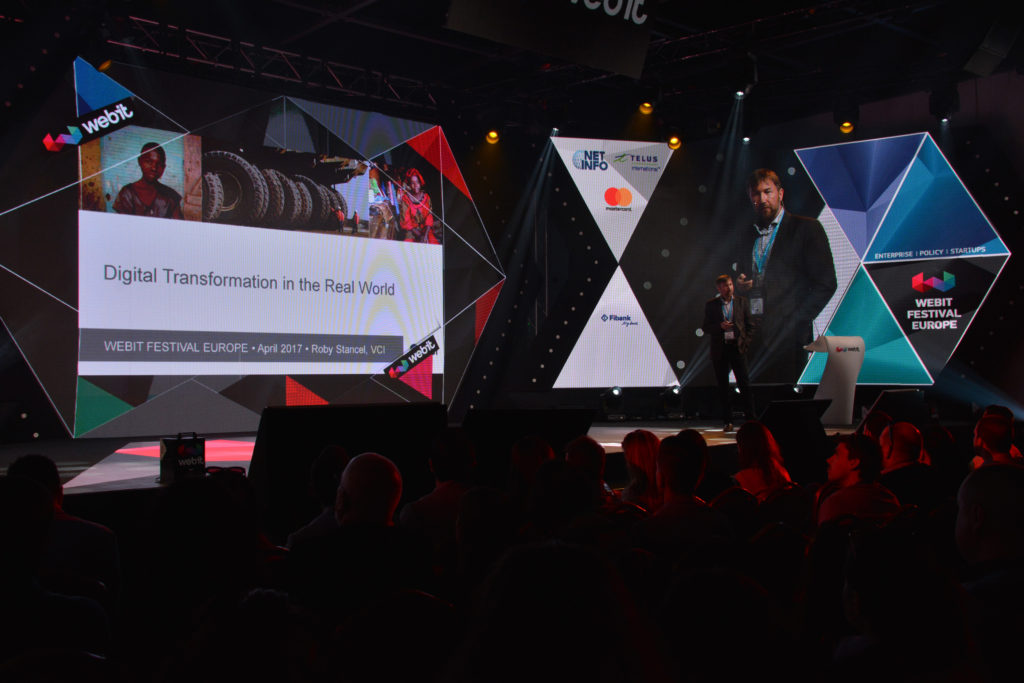 The Partner for Europe and Innovation at VCI Roby Stancel.[/caption]
Digitalization will revolutionize many real world industries so it won’t put them out of place. The automotive industry will still build cool cars and people will still want to drive their own vehicles because it means that they have freedom of movement.
But for example many big companies like VW are focusing on different aspects that can give them an added value. The German concern recently announced that it wants to be the best at weather forecasting. That means that every windshield wiper sensor and every traction control sensor in VW cars will tell the company exactly how the weather is in every place on the Earth. So the revolution in these German cars will be the ability to react to rapidly changing weather conditions.
The agriculture industry is also going through this. With a flying drone with infrared camera you can tell where there is enough water on the field and where there is not enough. And so therefore you can irrigate very focused and save a lot of resources. You can have for example the spray of chemicals can be greatly reduced because of this. You can also use weeding robots with optical recognition. They see the plants that we want and the weeds and pulls them up.
The Partner for Europe and Innovation at VCI Roby Stancel.[/caption]
Digitalization will revolutionize many real world industries so it won’t put them out of place. The automotive industry will still build cool cars and people will still want to drive their own vehicles because it means that they have freedom of movement.
But for example many big companies like VW are focusing on different aspects that can give them an added value. The German concern recently announced that it wants to be the best at weather forecasting. That means that every windshield wiper sensor and every traction control sensor in VW cars will tell the company exactly how the weather is in every place on the Earth. So the revolution in these German cars will be the ability to react to rapidly changing weather conditions.
The agriculture industry is also going through this. With a flying drone with infrared camera you can tell where there is enough water on the field and where there is not enough. And so therefore you can irrigate very focused and save a lot of resources. You can have for example the spray of chemicals can be greatly reduced because of this. You can also use weeding robots with optical recognition. They see the plants that we want and the weeds and pulls them up.
“But if I talk about the real world, let’s be clear about one thing. Software doesn’t do the work, real things and real people do. So unless your software is somehow connected to the real world you might have a very difficult time to convince people to do something about it”, he said.According to him, even if a company is number one in its industry, it can’t keep being successful only by advertising without creating real value because digitalization is going to wipe out many service industries in the next several years. He thinks that the current tech giant Facebook will disappear if it don’t manage to buy all the companies like WhatsApp that could be dangerous to them, because everyone hates Facebook. The users hate it because they have to view the world not through their eyes, but through a camera lens, helping them to post cool pictures in their feeds. The readers hate it because they sit on their desks and watch how everybody else is having a great time, which of course is an illusion. Companies hate it because they have to be there, so emotionally Facebook owns the world, but it is very loaded with negative value. And it is probably going to be replaced by a new company that offers similar reach but a better experience. Stancel is sure that the trust problems that many of the services we use today have will ultimately lead to their extinction.
“This is a main point. Innovation happens at the speed of trust, not at the speed of technology. You can dream up the most amazing things if you are able to put together all technology that we have today, but people will need to trust it”, the expert explained.As an example he pointed out the coming of the email - an event that was supposed to create the paperless office. But in the first years after its adoption, the emails led to an explosion in the amounts of paper used in offices around the world. Only now, a generation later, we actually have paperless offices, as the digital natives come into the workforce. So it is about the trust that people put into something, not in the technology. Another similar case is Tesla’s autopilot - a service that many people do not consider safe enough. According to Stancel the autonomous driving technology was available in the beginning of the century but just now the automakers think it is appropriate to start rolling it out into the mass production vehicles, because the society may be ready for that kind of change. [caption id="attachment_5000" align="aligncenter" width="640"]
 The Partner for Europe and Innovation at VCI Roby Stancel.[/caption]
Digitalization will revolutionize many real world industries so it won’t put them out of place. The automotive industry will still build cool cars and people will still want to drive their own vehicles because it means that they have freedom of movement.
But for example many big companies like VW are focusing on different aspects that can give them an added value. The German concern recently announced that it wants to be the best at weather forecasting. That means that every windshield wiper sensor and every traction control sensor in VW cars will tell the company exactly how the weather is in every place on the Earth. So the revolution in these German cars will be the ability to react to rapidly changing weather conditions.
The agriculture industry is also going through this. With a flying drone with infrared camera you can tell where there is enough water on the field and where there is not enough. And so therefore you can irrigate very focused and save a lot of resources. You can have for example the spray of chemicals can be greatly reduced because of this. You can also use weeding robots with optical recognition. They see the plants that we want and the weeds and pulls them up.
The Partner for Europe and Innovation at VCI Roby Stancel.[/caption]
Digitalization will revolutionize many real world industries so it won’t put them out of place. The automotive industry will still build cool cars and people will still want to drive their own vehicles because it means that they have freedom of movement.
But for example many big companies like VW are focusing on different aspects that can give them an added value. The German concern recently announced that it wants to be the best at weather forecasting. That means that every windshield wiper sensor and every traction control sensor in VW cars will tell the company exactly how the weather is in every place on the Earth. So the revolution in these German cars will be the ability to react to rapidly changing weather conditions.
The agriculture industry is also going through this. With a flying drone with infrared camera you can tell where there is enough water on the field and where there is not enough. And so therefore you can irrigate very focused and save a lot of resources. You can have for example the spray of chemicals can be greatly reduced because of this. You can also use weeding robots with optical recognition. They see the plants that we want and the weeds and pulls them up.
“As a matter of fact you can have infrared lasers that kills bugs and imagine if you could replace chemicals and GMO crops with digital technology. And it is happening so I’m with fingers crossed”, he said.You may watch his full lecture here: If you want to keep up with the latest trend in the world of digital economy and technology, then Webit.Festival is the right place for you. Visit our website and book 2 of our Super Earlybird tickets for Webit.Festival Europe 2018 for just €100. Feel the Webit vibe with some of the best photos from this year’s event! [easingslider id="4954"]
We are in a phase of development where disruption can’t be...
After so much talking about the changes coming with the development of digital technologies almost all of us now realize that we live in the time of the Fourth industrial revolution. Much has been said about the top tech innovations that are going to change the way we live, but the topic of the responsibility of corporations that are the driving force of those changes somehow remains aside from most of the discussions.
During this year’s Webit.Festival Europe the question was raised by the CEO of BulPros Ivaylo Slavov - a highly qualified entrepreneur and corporate executive, specialized both in developing startup and established organization. He has been working in different managerial roles at Microsoft, Adecco, SEB, Unisys, Comparex (PC Ware) across EMEA.
BULPROS is an international IT Solutions, Products & Services Corporation, specialized in Cloud, Security, IoT, Big Data and Analytics, Collaboration and Digital Transformation. The company is focused on Technology and Telecommunications, Financial Services, Insurance and Healthcare.
The company is one of the fastest growing technology enterprises in Central Europe according to Deloitte’s latest report “Technology Fast 50 in Central Europe” and “Technology Fast 500 in Europe, Middle East, and Africa”.
Slavov pointed out several examples of former market giants, such as Borders bookstores, Kodak and Blockbuster LLC that didn’t manage to go through the process of digital transformation on time and were forced to file for bankruptcy.
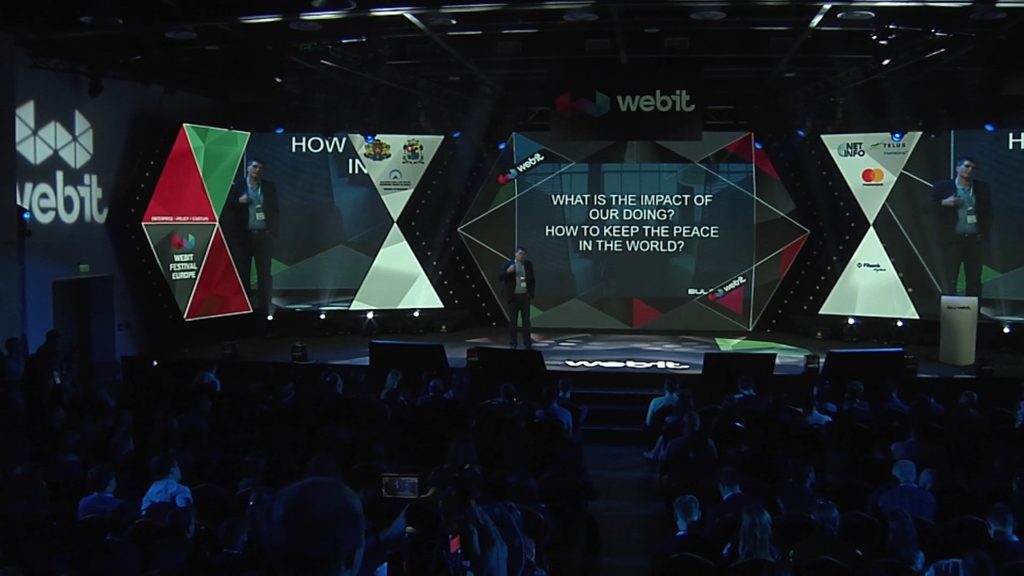 The CEO of BULPROS Ivaylo Slavov[/caption]
Slavov believes that all these questions must be raised by corporate leaders and policy makers around the world along with the discussions about the digital transformation. From his experience of local and international seminars, even the big brand executives still are not able to make long-term predictions about the landscape in their markets and the future of their teams and companies after 10 or 15 years.
He pointed out the differences between the Dot-com revolution he was a part of 19 years ago and said that the biggest problem then was the lack of connectivity and global access to technology.
In contrary, the then developed technologies, like the cloud computing, now enable corpоrations to implement their innovations at a larger scale than ever before. In the same time, thousands of startups and companies are disrupting each and every process in each and every industry using these resources.
The executive thinks that world’s leading companies must start asking themselves what role they have to take in the global governance from social, practical and educational side, so that the 7.2 billion people on the planet are treated well and have equal chance for development.
You may watch his full lecture here:
If you want to keep up with the latest trend in the world of digital economy and technology, then Webit.Festival is the right place for you. Visit our website and book 2 of our Super Earlybird tickets for Webit.Festival Europe 2018 for just €100.
Feel the Webit vibe with some of the best photos from this year’s event!
[easingslider id="4954"]
The CEO of BULPROS Ivaylo Slavov[/caption]
Slavov believes that all these questions must be raised by corporate leaders and policy makers around the world along with the discussions about the digital transformation. From his experience of local and international seminars, even the big brand executives still are not able to make long-term predictions about the landscape in their markets and the future of their teams and companies after 10 or 15 years.
He pointed out the differences between the Dot-com revolution he was a part of 19 years ago and said that the biggest problem then was the lack of connectivity and global access to technology.
In contrary, the then developed technologies, like the cloud computing, now enable corpоrations to implement their innovations at a larger scale than ever before. In the same time, thousands of startups and companies are disrupting each and every process in each and every industry using these resources.
The executive thinks that world’s leading companies must start asking themselves what role they have to take in the global governance from social, practical and educational side, so that the 7.2 billion people on the planet are treated well and have equal chance for development.
You may watch his full lecture here:
If you want to keep up with the latest trend in the world of digital economy and technology, then Webit.Festival is the right place for you. Visit our website and book 2 of our Super Earlybird tickets for Webit.Festival Europe 2018 for just €100.
Feel the Webit vibe with some of the best photos from this year’s event!
[easingslider id="4954"]
“All these examples show us that we can’t stop the disruption. Today we are in a phase where the disruption can’t be stopped. We are in the phase of the Fourth industrial revolution. And my question to all of you here is what we do about the global governance”, he asked.The executive is certain that in the time we live in corporations have the opportunity and responsibility to create a world with equitable participation of all people in formal and societal governance in accordance with principles of justice and individual rights, free from discrimination and identity-based prejudices. He thinks that the power of private initiative will enable the big tech companies to meet the needs of an exponentially changing world. According to him, measuring the exact impact of the upcoming changes to our life is crucial for every player on the market. The reason is that the exponential changes that we are going to experience in the next decades will affect not only entertainment and software development and infrastructure, but also our jobs, the way we use transport, communicate and understand the world around us.
“We have more than 7 billion people around the world which are living under different social conditions. We have many individuals that will potentially be affected by automation. We have many situations which could be changed dramatically in terms of losing jobs and understanding how those things will develop”, he said.[caption id="attachment_4997" align="aligncenter" width="640"]
 The CEO of BULPROS Ivaylo Slavov[/caption]
Slavov believes that all these questions must be raised by corporate leaders and policy makers around the world along with the discussions about the digital transformation. From his experience of local and international seminars, even the big brand executives still are not able to make long-term predictions about the landscape in their markets and the future of their teams and companies after 10 or 15 years.
He pointed out the differences between the Dot-com revolution he was a part of 19 years ago and said that the biggest problem then was the lack of connectivity and global access to technology.
In contrary, the then developed technologies, like the cloud computing, now enable corpоrations to implement their innovations at a larger scale than ever before. In the same time, thousands of startups and companies are disrupting each and every process in each and every industry using these resources.
The executive thinks that world’s leading companies must start asking themselves what role they have to take in the global governance from social, practical and educational side, so that the 7.2 billion people on the planet are treated well and have equal chance for development.
You may watch his full lecture here:
If you want to keep up with the latest trend in the world of digital economy and technology, then Webit.Festival is the right place for you. Visit our website and book 2 of our Super Earlybird tickets for Webit.Festival Europe 2018 for just €100.
Feel the Webit vibe with some of the best photos from this year’s event!
[easingslider id="4954"]
The CEO of BULPROS Ivaylo Slavov[/caption]
Slavov believes that all these questions must be raised by corporate leaders and policy makers around the world along with the discussions about the digital transformation. From his experience of local and international seminars, even the big brand executives still are not able to make long-term predictions about the landscape in their markets and the future of their teams and companies after 10 or 15 years.
He pointed out the differences between the Dot-com revolution he was a part of 19 years ago and said that the biggest problem then was the lack of connectivity and global access to technology.
In contrary, the then developed technologies, like the cloud computing, now enable corpоrations to implement their innovations at a larger scale than ever before. In the same time, thousands of startups and companies are disrupting each and every process in each and every industry using these resources.
The executive thinks that world’s leading companies must start asking themselves what role they have to take in the global governance from social, practical and educational side, so that the 7.2 billion people on the planet are treated well and have equal chance for development.
You may watch his full lecture here:
If you want to keep up with the latest trend in the world of digital economy and technology, then Webit.Festival is the right place for you. Visit our website and book 2 of our Super Earlybird tickets for Webit.Festival Europe 2018 for just €100.
Feel the Webit vibe with some of the best photos from this year’s event!
[easingslider id="4954"]
